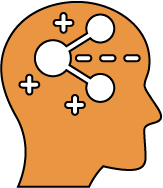Can I Change My Pronouns?
Last Reviewed:
Reviewed By:
Everyone has the right to define their gender identity and express their gender. Recognition and respect for an individual’s gender identity and expression begins with using their names and pronouns correctly, which is a right recognized and protected by the BC Human Rights Code.
Pronouns
Pronouns are how we refer to people without using their names, e.g, he, she, they. In the English language pronouns traditionally match a person’s sex at birth, but sometimes people feel gendered pronouns don’t fit or apply to their gender identity. Using someone’s correct pronouns validates their identity and can make them feel included and welcome.
Human Rights and Pronouns
Gender identity and gender expression are protected characteristics in the BC Human Rights Code. This means that employers, landlords, service providers, and other duty-bearers must not discriminate against someone due to their gender identity or expression.
Real Case
“Like a name, pronouns are a fundamental part of a person’s identity. They are a primary way that people identify each other. Using correct pronouns communicates that we see and respect a person for who they are. Especially for trans, non-binary, or other non-cisgender people, using the correct pronouns validates and affirms they are a person equally deserving of respect and dignity.”
Nelson v. Goodberry Restaurant Group Ltd. Dba Buono Osteria and others, 2021 BCHRT 137
Can I choose my pronouns at school?
In alignment with the Human Rights Code of BC, students have the right to self identification and to decide the name(s) and pronoun(s) by which they are addressed.
Will teachers tell my parents if I change my pronouns?
Generally, there is no obligation for teachers to disclose if you change your pronouns. Many school districts have policies to respect students' pronouns and will not inform their parents if the student does not wish it. Check your school district website or the school board/district you are in for specific information about your school’s policies about privacy around your pronouns.


Legal Lingo
Gender Identity is your internal and psychological sense of yourself as a woman, a man, both, in between, or neither. Gender identity is unique to each individual and is not determined by sex or defined by sexual orientation. Your gender identity may shift and evolve as you get to know yourself better, and that is normal and okay. Only you can determine your gender identity.
Gender expression refers to a person’s behaviour, mannerisms, interests and appearance. A person’s gender expression may or may not align with their gender identity. Gender expression cannot be deduced from a person’s sex at birth, the gender/sex indicated on their legal documents, or their reported gender identity or pronouns.
Sexual orientation means how you are attracted romantically and sexually to other people. Everybody has both a gender identity and a sexual orientation.
How do you know your pronouns?
There are no strict rules when it comes to choosing which pronouns fit you best. Advocacy groups for LGBTQi+ people in Canada advise that the key is to take your time, and know that it is okay to change your choice.


Get help
Whatever your orientation or gender identity, it’s important to realize there are lots of people like you, and that you are not alone. Many of them may have the same emotions and questions that you have.
For more information about gender identity and sexual orientation, including how to find support services in your area, visit Qmunity: BC's Queer Resource Centre or contact Trans Care BC by calling 604-675-3647 or toll free 1-866-999-1514.
 Crime & Police
Crime & Police Money Stuff
Money Stuff Health & Sexuality
Health & Sexuality Legal Life Skills
Legal Life Skills Driving
Driving Family
Family Work & School
Work & School Housing
Housing Basic Rights
Basic Rights